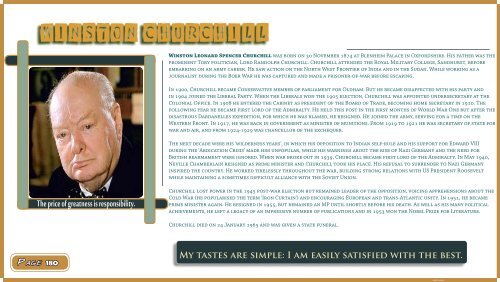Create successful ePaper yourself
Turn your PDF publications into a flip-book with our unique Google optimized e-Paper software.
Winston Churchill<br />
Winston Leonard Spencer Churchill was born on 30 November 1874 at Blenheim Palace in Oxfordshire. His father was the<br />
prominent Tory politician, Lord Randolph Churchill. Churchill attended the Royal Military College, Sandhurst, before<br />
embarking on an army career. He saw action on the North West Frontier of India and in the Sudan. While working as a<br />
journalist during the Boer War he was captured and made a prisoner-of-war before escaping.<br />
In 1900, Churchill became Conservative member of parliament for Oldham. But he became disaffected with his party and<br />
in 1904 joined the Liberal Party. When the Liberals won the 1905 election, Churchill was appointed undersecretary at the<br />
Colonial Office. In 1908 he entered the Cabinet as president of the Board of Trade, becoming home secretary in 1910. The<br />
following year he became first lord of the Admiralty. He held this post in the first months of World War One but after the<br />
disastrous Dardanelles expedition, for which he was blamed, he resigned. He joined the army, serving for a time on the<br />
Western Front. In 1917, he was back in government as minister of munitions. From 1919 to 1921 he was secretary of state for<br />
war and air, and from 1924-1929 was chancellor of the exchequer.<br />
The next decade were his 'wilderness years', in which his opposition to Indian self-rule and his support for Edward VIII<br />
during the 'Abdication Crisis' made him unpopular, while his warnings about the rise of Nazi Germany and the need for<br />
British rearmament were ignored. When war broke out in 1939, Churchill became first lord of the Admiralty. In May 1940,<br />
Neville Chamberlain resigned as prime minister and Churchill took his place. His refusal to surrender to Nazi Germany<br />
inspired the country. He worked tirelessly throughout the war, building strong relations with US President Roosevelt<br />
while maintaining a sometimes difficult alliance with the Soviet Union.<br />
The price of greatness is responsibility.<br />
Churchill lost power in the 1945 post-war election but remained leader of the opposition, voicing apprehensions about the<br />
Cold War (he popularised the term 'Iron Curtain') and encouraging European and trans-Atlantic unity. In 1951, he became<br />
prime minister again. He resigned in 1955, but remained an MP until shortly before his death. As well as his many political<br />
achievements, he left a legacy of an impressive number of publications and in 1953 won the Nobel Prize for Literature.<br />
Churchill died on 24 January 1965 and was given a state funeral.<br />
Page 180<br />
My tastes are simple: I am easily satisfied with the best.<br />
Abhi Sharma


